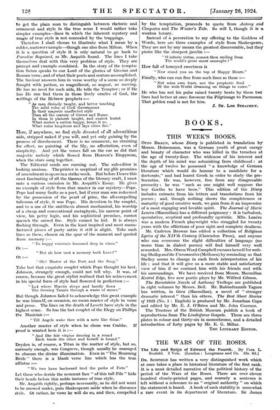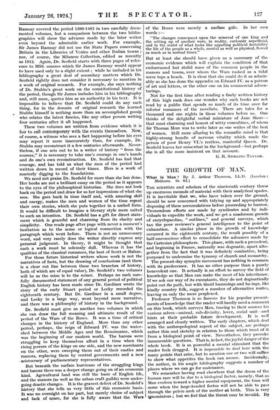THE WARS OF THE ROSES.
Du. SCOFIELD has written a very distinguished work which at once takes a place in historical literature of the first rank. It is a most detailed narrative of the political history of the period of the Wars of the Roses. There are over eleven hundred closely-printed pages, and scarcely a sentence is left without a reference to an " original authority " on which
the statement is based. A book of such stability is somewhat a rare event in its department of literature. Sir James Ramsay covered the period 1399-1485 in two carefully docu- mented volumes, but a comparison between the two biblio- graphies will show the advance made by the later writer even beyond the admirable earlier work. For example, Sir James Ramsay did not use the State Papers concerning Britain in the Libraries of Venice and other Italian towns ; nor, of course, the Milanese Collection, edited as recently as 1912. Again, Dr. Scofield starts with three pages of refer- ence to MSS. sources which Sir James Ramsay would appear to have used only to a slight extent ; while he included in his bibliography a great deal of secondary matters which Dr. Scofield rightly does not consider it necessary to mention in a work of original research. For example, she says nothing of Dr. Stubbs's great work on the constitutional history of the period, though Sir James includes him in his bibliography and, still more, quotes him as an authority in his text. It is impossible to believe that Dr. Scofield could do any such thing, for in the domain of original research the learned Stubbs himself is nothing more than an accomplished gossip who relates the latest fancies, like any other person writing four centuries after it all happened.
These two volumes are written from evidence which it is
fair to call contemporary with the events themselves. Now,
of course, a witness who sees a fact happening before his eyes may report it more inaccurately than, for example, Dr.
Stubbs may reconstruct it a few centuries afterwards. Never- theless, if one sets out to be a writer of history " from the sources," it is necessary to take one's courage in one's hands and do one's own reconstruction. Dr. Scofield has had that courage, and has told us what the men of the period had written down in record of their times. Hers is a work of masterly digging to the foundations.
We need not praise Dr. Scofield for more than she has done. Her books are not a brilliant essay on the period as it appears to the eyes of the philosophical historian. She does not look back on the period and draw for us her impressions of what she sees. She goes back in time itself and, with amazing skill and energy, makes the men and women of the time repeat their own stories, which she puts together in a united form. It would be difficult to imagine a literary style more suited to such an intention. Dr. Scofield has a gift for direct state- ment which is graceful and charming from its clarity- and simplicity.. One reads page after page with never a moment's hesitation as to the sense or logical connection with the paragraph which went before. There is not an unnecessary word, and very rarely does the writer directly express any personal judgment. In theory, it might be thought that such a work must be solemnly dull. Whereas it has the qualities of the classical romances, the best of Scott or Balzac.
For those future historical writers whose work is not the narratives of facts, but the drawing of conclusions (and there is a clear cut line between these two branches of history, both of which are of equal value), Dr. Scofield's two volumes will be as the mine is to the miner. Perhaps no such care- fully documented statement of any general period of political English history has been made since Dr. Gardiner wrote the story of the early Stuart period or Lecky recorded the eighteenth century. But Dr. Gardiner in a small degree, and Lecky in a large way, went beyond mere narrative, and there was a philosophy of history in the background.
Dr. Scofield must give us another two volumes in which she can draw the full meaning and ultimate result of the period of the Wars of the Roses. It was a time of critical changes in the history of England. More than any other period, perhaps, the reign of Edward IV. was the water- shed between the Middle Ages and the Renaissance, which was the beginning of our modern world. The barons were struggling to keep themselves afloat in a time when the rising powers of the kings on one side, and the new merchants on the other, were sweeping them out of their castles and manors, replacing them by central governments and a new aristocracy of parliamentary representatives.
But beneath the surface hurricane of the struggling kings and barons there was a deeper change going on of an economic kind. Agricultural land was still the basis of English life, and the manors (as well as the urban craft guilds) were under- going drastic changes. It is the gravest defect of Dr. Scofield's history that she tells us very little of this economic basis. It was no oversight on her part, but merely choice of subject and lack of space, for she is fully aware that the Wars of the Roses were merely a surface gale. In her own words
"The changes consequent upon the removal of one king and the setting up of another were, in reality, curiously superficial, and in the midst of what looks like appalling political instability the life of the people as a whole, mental as well as physical, flowed as much as in normal times."
But at least she should have given us a summary of the economic evidence which will explain the condition of that embarrassed but stolid mass of the common people in the manors and towns, over whom the Wars rushed as a tidal wave tops a beach. It is clear that she could do it as adm ir- ably as she has done the appendix on Edward IV. as a patron of art and letters, or the other one on his commercial adven- turings.
Not for the first time after reading a finely written history of this high rank does one wonder why such books arc not read by a public that spends so much of its time over far inferior romances of the novelists. There are tales for a thousand and one nights in these volumes before us. One thinks of the delightful verbal miniature of Jane Shore— that most charming and honest of witty concubines, of whom Sir Thomas More was to write later as one writes of the best of women. Still more alluring to the romantic mind is that highly-strung bundle of nervous vitality which made the person of poor Henry VI.'s restless, masterful Queen. Dr. Scofield leaves her somewhat in the background--but perhaps she is all the more insistent on that account.
G. R. STIRLING TAYLOR.



































 Previous page
Previous page